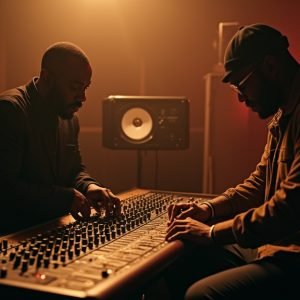The digital landscape of hip-hop has been abuzz following the emergence of leaked jail phone conversations allegedly featuring rapper Young Thug (Jeffery Lamar Williams) delivering a scathing critique of fellow artist Future’s (Nayvadius DeMun Wilburn) parenting priorities. These audio snippets, reportedly recorded during calls with his girlfriend, R&B artist Mariah The Scientist, have not only sent shockwaves through the music community but have also reignited broader discussions about fatherhood responsibilities, celebrity accountability, and the ethics of privacy in the digital age.
Young Thug, who himself has recently navigated significant legal challenges, including a plea deal in the YSL RICO trial that led to his release from jail in late 2024 and subsequent probation, appears to have used his incarcerated period to voice candid, and at times critical, opinions about his peers. This particular leak focuses on Future, a prominent artist known for his extensive catalog and a large family, reportedly including seven children with multiple women. The core of Young Thug’s alleged commentary centers on Future’s perceived prioritization of romantic relationships over his paternal duties.
Future’s Fatherhood Under the Microscope
In the leaked conversations, Young Thug reportedly labels Future a “deadbeat father,” contrasting his approach with that of the late Bob Marley, whom Thug cites as an example of a devoted parent despite fathering numerous children. The criticism suggests a pattern where Future is “100% locked in with the b*s” rather than his children. This sentiment taps into a persistent societal concern regarding absent fatherhood, particularly amplified when such discussions involve highly visible public figures whose personal lives are under constant scrutiny. The critique implies a value system that champions consistent parental engagement as a fundamental aspect of male responsibility, challenging the notion of prioritizing romantic pursuits at the expense of familial obligations.
Celebrity Accountability in the Music Industry
The release of these private conversations brings to the forefront the complex relationship between artists and their public personas, especially within the vibrant and often scrutinized world of hip-hop. For years, discussions have swirled around whether prominent musicians should serve as role models, a notion many artists themselves have pushed back against, emphasizing their primary role as entertainers. However, incidents like these, where intimate personal critiques are made public, blur the lines between private life and public discourse. The art and personal lives of hip-hop artists are frequently intertwined, leading to intense fan engagement and speculation. This particular news story highlights how personal opinions, even when expressed in private, can spark widespread debate about cultural values and expectations placed upon public figures.
The Ethics of Leaked Private Communications
Beyond the parenting debate, the very act of these jail calls being leaked raises significant ethical questions. In an era where digital footprints are vast and privacy is increasingly fragile, the unauthorized dissemination of personal conversations poses a challenge to individual autonomy and trust. This trend of leaked messages and recordings involving celebrities is not new, as evidenced by numerous past incidents involving various public figures, often leading to intense public fascination and reputational damage. The implications for privacy are profound, as it questions the security of personal communications and the potential for private struggles to be commodified as public entertainment. While such leaks can offer a voyeuristic glimpse into the personal lives of the famous, they also risk misinterpretation, online bullying, and the erosion of trust within relationships, impacting both the individuals involved and the broader cultural conversation.
Societal Echoes and Public Reaction
The public reaction to these leaked conversations has been varied, with a segment of social media users treating the revelations as mere entertainment, while others engage with the underlying issues of parental responsibility and accountability. This mixed response reflects broader cultural tendencies to consume celebrity drama as content, potentially overshadowing the seriousness of the issues discussed. The incident underscores the intricate tapestry of modern masculinity, evolving expectations of fatherhood, and the pressures faced by individuals, both famous and ordinary, in balancing personal relationships, public life, and their roles as parents. The ongoing dialogue serves as a microcosm of larger societal conversations about personal integrity, public scrutiny, and the very definition of responsible behavior in contemporary culture.
In conclusion, the leaked jail calls involving Young Thug and his critique of Future’s parenting have served as a potent catalyst for widespread discussion. They highlight the delicate intersection of private lives and public personas within the hip-hop music industry, forcing a re-examination of the responsibilities artists carry and the pervasive ethical considerations surrounding privacy and the dissemination of personal information in the digital age. The debate continues to unfold, reflecting complex attitudes toward fatherhood, celebrity, and the very nature of public discourse in the 21st century.
























